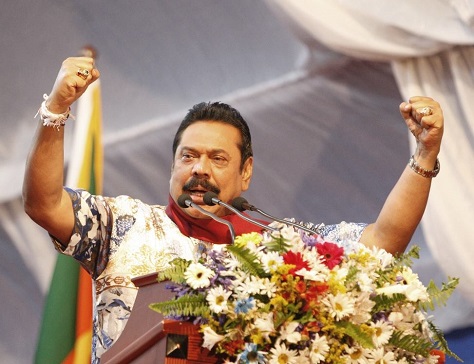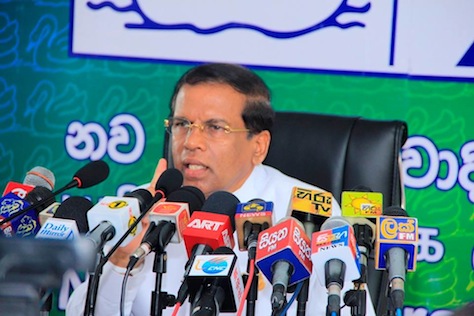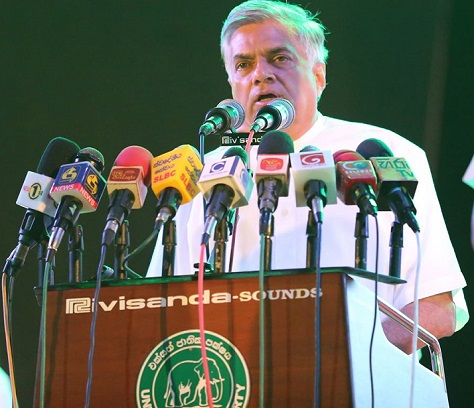
Pessimists worry that today could bring the first coup in Sri Lanka’s post-independence history, as political tensions are running high and military forces are rumored to be out in strong numbers as Sri Lankans go to the polls to elect a new president. 
They’ll do so in one of the tightest such races in Sri Lanka’s history, at least the tightest since president Mahinda Rajapaksa first took power in the 2005 election, and one with profound consequences for the direction of Sri Lanka’s democratic and policy future and with important regional implications for both India and China.
When the folksy Rajapaksa (pictured above) brought forward the election by two years in November, he hoped to take advantage of a fractured opposition and new rules that allowed him to call early election in either of the final two years of his six-year presidential term and revisions to the Sri Lankan constitution that allow Rajapaksa to seek a third consecutive term to the presidency. He didn’t plan, instead, on a close election that could bring his administration to a premature end.
Sri Lanka is an island country just off the southeastern coast of India. With over 22 million people, it’s one-third as populous as France (though it pales in comparison to many of India’s states — Tamil Nadu, for example, is home to nearly 70 million people alone). Formerly the British crown colony of Ceylon, the country was trapped for much of the past quarter-century in a civil war waged between the government and the Liberation Tigers of Tamil Eelam (தமிழீழ விடுதலைப் புலிகள்), popularly known as the ‘Tamil Tigers,’ a guerrilla group fighting to form an independent Tamil state. Despite false starts at peace talks, Rajapaksa presided over the group’s military defeat in 2009, a victory that has allowed Sri Lanka to put the fighting of the 1980s and 1990s behind it. Accordingly, under Rajapaksa, Sri Lanka has enjoyed annual GDP growth of nearly 7% over the last decade, doubled per-capita income in the last five years, and marked massive reductions in poverty.
Nevertheless, the country remains precariously split between a Sinhalese-speaking majority that practices Buddhism (around 70% of the population) and its Tamil and Muslim minorities. Its Tamil-speaking minority practices Hinduism, not Buddhism — around 11% of the population consists of Sri Lankan Tamils clustered along the northern and eastern coasts and another 4% or so Indian Tamils clustered in the central highlands. Another 10% or so of the population consists of Tamil-speaking Sri Lankan Moors, who largely follow Islam.
For all of Rajapaksa’s successes in subduing the Tamil Tigers, he has become notorious for centralizing power in the Sri Lankan presidency since taking power a decade ago and amassing wealth for himself and his family, many of whom populate powerful positions in the government.

The widespread impression of corruption and abuse of power is at the heart of the challenge to Rajapaksa’s reelection. His opponent, Maitripala Sirisena (pictured above), was until November 21, not only the health minister in Rajapaksa’s government, he was the general secretary of Rajapaksa’s ruling Sri Lanka Freedom Party (SLFP, ශ්රී ලංකා නිදහස් පක්ෂය), the vaguely center-left ruling party that draws much of its support from the country’s Sinhalese majority.
In one fell swoop, Sirisena not only united the unruly opposition, but he brought more than two dozen members of the ruling Freedom Party into an anti-Rajapaksa coalition that includes the United National Party (UNP, එක්සත් ජාතික පක්ෂය), a more center-right party that draws support from minorities as well as Sinhalese voters, and any number of parties based on everything from Buddhist nationalism to Marxism. Less charismatic than the incumbent, Sirisena nevertheless heads a once-improbable movement that could topple Rajapaksa, tapping into the same ferocious energy with which Indian prime minister Narendra Modi ousted the long-ruling Nehru-Gandhi family and the Indian National Congress in last spring’s Indian elections. Continue reading Tumultuous election a test for Sri Lankan democracy →
![]()


